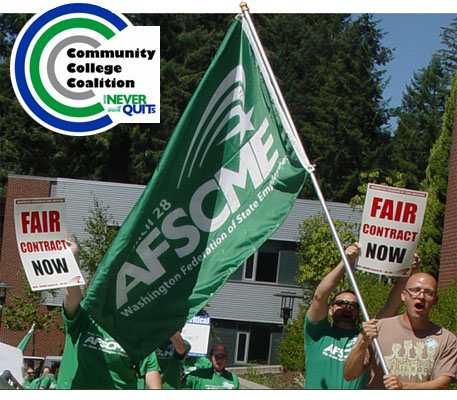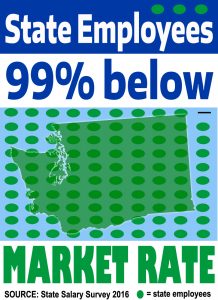STATE GOVERNMENT
Support college workers seeking fair wages
 OLYMPIA (Aug. 25, 2016) — Earlier this month, state employees from several community colleges and their supporters rallied at South Puget Sound Community College and Spokane Community College to support a fair contract before the Community College Coalition Bargaining Team for the Washington Federation of State Employees/AFSCME held its latest bargaining session with the state.
OLYMPIA (Aug. 25, 2016) — Earlier this month, state employees from several community colleges and their supporters rallied at South Puget Sound Community College and Spokane Community College to support a fair contract before the Community College Coalition Bargaining Team for the Washington Federation of State Employees/AFSCME held its latest bargaining session with the state.
It didn’t go well.
The bargaining team, which represents more than 3,200 employees at 12 community college campuses across Washington, reported that state negotiators are saying “no” to real raises that would move employees closer to market-rate pay. But worse, the coalition bargaining team “felt insulted and disrespected by management’s proposals and counter proposals regarding compensation and part-time hourly (employees).”
TAKE A STAND! — CLICK HERE to send a letter to state negotiators that says, after years of takeaways for community college employees, you support a fair contract that includes real raises and no additional costs piled onto their health care.
Then, get out your calendar and set aside next Wednesday, Aug. 31. Make plans to join a coalition of unions representing all state employees at the Invest in Washington Rally at noon on Aug. 31. Participants will urge Gov. Jay Inslee to stop the revolving door for state employment and invest in his workforce to keep Washington working for our communities. RSVP for the rally here.

BACKGROUND — For years, state employees at community colleges have taken pay cuts and added workloads because of less staff and higher health costs. Employees have looked to these contract negotiations as the time to honor those sacrifices and keep the community colleges a competitive “Employer of Choice.”
 After all, how can colleges offer a first-class education when 99 percent of state employees are making second-class wages, below market rates of pay. This is an even bleaker situation than the 2014 state employee salary survey, when 81 percent were behind market rates statewide. Clearly, the problem is getting worse.
After all, how can colleges offer a first-class education when 99 percent of state employees are making second-class wages, below market rates of pay. This is an even bleaker situation than the 2014 state employee salary survey, when 81 percent were behind market rates statewide. Clearly, the problem is getting worse.
Since 2009, college enrollment has dropped by 8 percent, but staff has been cut by 19 percent. That’s no way to attract students when community colleges educate 59 percent of higher education students in Washington state.
The combination of significantly lagging wages — particularly among the skilled trades — and increased workloads from staffing cuts have led to higher turnover. That’s a disservice to the students that college staff have dedicated their careers to serving.
Here are some more facts from WFSE:
● More than 3,000 community college employees system-wide qualify for food stamps and public assistance.
● Burger King — and other low-paid jobs — PAY
MORE than many entry-level jobs at community colleges in Washington state.
● Fully 99 percent of community college employees are paid LESS than market rate for the jobs they do, and 75 percent of community college employees are more than 25 percent behind market rates in pay.
● Community colleges are increasingly utilizing part-time hourly workers and paying them LESS to do the same work. Since 2012, Washington community colleges have hired more than 2,800 part-time hourly workers — just in WFSE-represented bargaining units. Of these, 990 have accumulated more than 12 months of work, but are considered “temporary” by the colleges. In General Government, part-time hourly employees become permanent employees after 12 months of work. Why does this double-standard exist in our community colleges?
Please support community college workers by sending a letter to state negotiators that says you support a fair contract that includes real raises and no additional costs piled onto their health care. And make plans to support all Washington state employees at the Aug. 31 rally.





